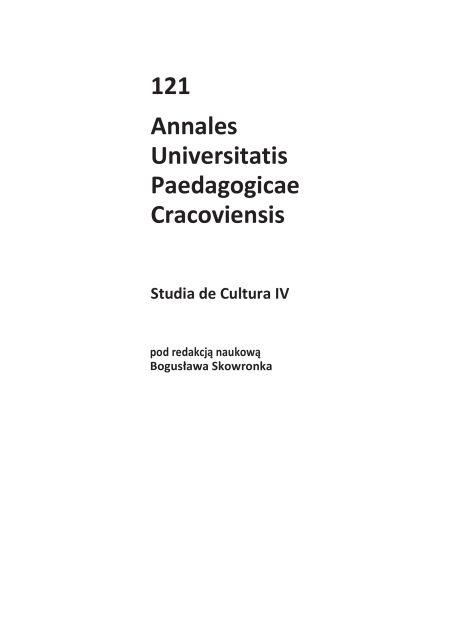Abstract
“Posthuman outrage” - posthuman defining of outrage in technology, information and relationships between species
A special response to the various manifestations of posthumanistic idea may be the sense of scandal. It may be related to the lack of acceptance of the idea of non-human entity and therefore, its broad definition, and the act of inviting an entity to become creations of different ontological status. However, it appears that the scandal may have a reciprocal nature. Shocking may be both a definition formed from the anthropocentric point of view (for posthumanists) as well as from posthuman perspective, when followers of the rhetoric of openness to the “other” can manifest their disagreement over narrow vision of subjectivity. Thus the shape of the subject relations comes under an intensive discoursivisation in the sphere of social and cultural activity, which I would like to survey in this text. The article aims to show the intricate circumstances of a scandal that might arise in the discussion about subjectivity. I will demonstrate how scandal manifests itself within the three areas: interspecies relations, technological and information areas, by analyzing selected case studies within each of the areas.
References
Aarseth E., Walczyłem przeciw prawu: wywrotowa gra i gracz implikowany, przeł. P. Wojcieszuk, „Kultura i Historia” 2008, nr 3.
View in Google Scholar
Ackerman E., Arse Elektronika 2007: F**king Robots, http://www.botjunkie.com/2007/10/07/arse-elektronika-2007-fking-robots.
View in Google Scholar
Agamben G., Homo sacer. Suwerenna władza i nagie życie, przeł. M. Salwa, Warszawa 2008.
View in Google Scholar
Agamben G., The Open: Man and Animal, Stanford University Press, Stanford California 2004.
View in Google Scholar
Castricano J. (red.), Animal Subjects. An Ethical Reader in a Posthuman World, Wilfrid Laurier University Press 2008.
View in Google Scholar
Davies G.A., Pistorius protests insult, storms out of interview, http://ww.telegraphindia.com/1110908/jsp/sports/story_14480073.jsp.
View in Google Scholar
Derrida J., Of Hospitality, Stanford University Press, Stanford, California 2000.
View in Google Scholar
Derrida J., The Animal That Therefore I am, ed. by M.-L. Mallet, Fordham University Press, New York 2008.
View in Google Scholar
Haraway D., Companion Species Manifesto, Dogs, People and Significant Otherness, Prickly Paradigm Press, Chicago 2003.
View in Google Scholar
Haraway D., Simians, Cyborgs and Women: The Reinvention of Nature, Routledge, New York 1991.
View in Google Scholar
Haraway D., When species meet, University of Minnesota Press, Minneapolis, London 2008.
View in Google Scholar
Haraway D., Zwierzęta laboratoryjne i ich ludzie, przeł. A. Ostolski, „Krytyka Polityczna” 2008, nr 15.
View in Google Scholar
Hayles N.K., How We Became Posthuman: Virtual Bodies in Cybernetics, Literature, and Informatics, University of Chicago Press 1999.
View in Google Scholar
Kamyszek M., Seria gier „The Sims” – porównanie edycji, struktura rozgrywki, profil graczy, strategie promocyjne (niepublikowana praca licencjacka 2010).
View in Google Scholar
Lacan J., Ecrits. The First Complete Edition in English, trans. by B. Fink, W.W. Norton & Company, New York, London 2007.
View in Google Scholar
Luhmann N., Systemy społeczne. Zarys ogólnej teorii, przeł. M. Kaczmarczyk, Kraków 2007.
View in Google Scholar
Stasieńko J., Alien vs. Predator? Gry komputerowe a badania literackie, Wrocław 2005.
View in Google Scholar
Violet Blue, Why Machine Sex? / Violet Blue goes deep undercover to find out why women like to have sex with machines, and why people pay good money to watch http://articles.sfgate.com/2008-10-02/living/17119433_1_machine-ing-pornographer/3
View in Google Scholar
Wardrip-Fruin N., Mateas M., Dow S., Sali S., Agency Reconsidered Breaking New Ground: Innovation in Games, Play, Practice and Theory, Proceedings of DiGRA 2009.
View in Google Scholar

